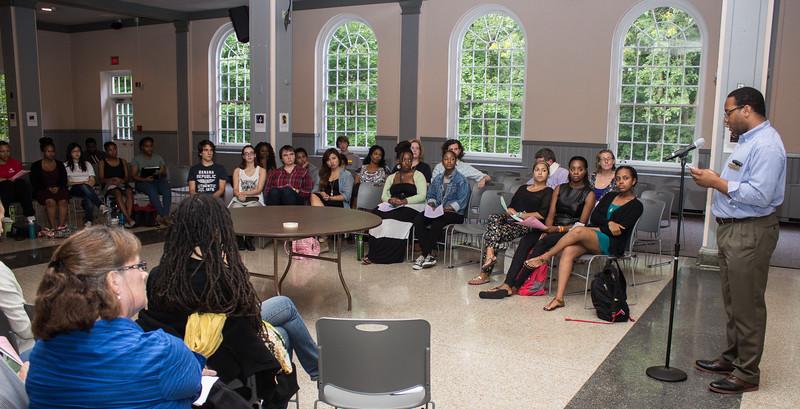Community Discusses Ferguson
September 12, 2014
Multicultural Student Services (MSS) hosted the “Ferguson and Beyond: Our Lives Matter” event for an open discussion. Fifteen posters were hung about the room, each including a picture of an African American with the story of their shooting below. Approximately 40 University members met to discuss their personal reactions to these events and their ideas for change in the future.
Janice Butler, director of the Office of Civic Engagement and Service Learning, kicked off the discussion with a message to encourage change.
“Each time one of these tragedies happens, there are innumerable ripple effects. For so many, things will not be the same. Ferguson will never be the same, and we can only hope that is a good thing,” Butler said. “The small Missouri community should be transformed by these incidents. We, too, should not remain the same. We should be stirred to movement, stirred to change the injustices in our system, the race and class oppression that contributes to these tragedies.”
The discussion began by addressing what happened in Ferguson, Mo. On Aug. 9, 18-year-old Michael Brown, an African American, was shot six times– four times in the right arm and twice in the head. He was unarmed.
As the discussion continued, people shared their thoughts, concerns and even personal experiences with racial oppression. David Ragland, visiting assistant professor of Education, shared that he has been profiled, stopped, and questioned at least 25 times in his life because he fit a specific description. He feels humiliation and anger that people of color do not receive the same respect and are denied human dignity.
It is estimated that in the United States, a black man is killed every 28 hours.
Brown is only one of the many victims of racial oppression at the hands of the police. Jonathan Ferrell was unarmed and shot 10 times by a police officer in Charlotte, N.C. last year. In 2006, Sean Bell was shot right before his wedding while in his car with two friends. Trayvon Martin was shot by a mixed race Hispanic and white police officer when he was unarmed in 2012. John Crawford was shot down in an Ohio Walmart while holding a pellet gun just days before the Brown shooting.
Students at the meeting shared their personal experiences, which included being chased down and pushed onto a car, being pulled over unjustly and having their car searched, and not being served at a farmers market in Lewisburg.
“It’s us versus [the police] and it feels like that’s always how it’s gonna be,” Shaquille Anderson ’15 said.
“I appreciate the solidarity shown at the meeting because it shows a shift in consciousness. Instead of contemplating how to go about things alone, we see the power in a collective effort. The minds in that room were great, and these minds have the ability to be agents of change. I hope that we can go forth and take action because to sit and talk about these things in abstract trivializes what’s going because these events are happening in real life,” Shirah Moffatt-Darko ’18 said.
The discussion concluded with a goal to start social movements and make a change, realizing that racism does not only occur in Ferguson, but everywhere–even in Lewisburg.
“If you are not a person of color and you need something to think about, or to relate to, imagine leaving your house or your dorm room every day in fear that the way people feel about you will turn into action and that it’s quite possible that no one will do anything about it,” Zoe Russell ’17 said.





















